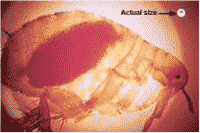
December 2010
Plague is an infectious disease caused by the bacteria Yersinia pestis that can affect both humans and animals.
There are three forms of plague:

Historically plague caused worldwide epidemics that led to millions of deaths. The most widely known plague epidemic was the Black Death of 14th century Europe. This was in a time when human homes and workplaces were inhabited by flea-infested rats. Outbreaks are a rare occurrence today due to improved living conditions, public health and antibiotic treatment.
Approximately 2,000 cases are reported to the World Health Organization each year, mostly from Africa, South America and Asia. About 10 – 15 cases of plague occur each year in the southwestern U.S.A; these cases are usually from contact with wild animals. Large outbreaks are rare.
Symptoms usually occur one to 10 days after exposure. Initial symptoms are flu-like complaints: fever, chills, muscle pain, weakness and headache. A swollen and very tender lymph gland, accompanied by pain, is another symptom. Pneumonic plague symptoms: rapidly developing pneumonia with shortness of breath, chest pain, cough and sometimes bloody or watery sputum. The pneumonia may cause respiratory failure and shock. If left untreated, the person may die.
Antibiotics such as streptomycin, gentamicin and others are effective treatments for plague. People with pneumonic plague need to be placed in medical isolation so they do not pass it on to other people.
Currently, there is no vaccine available for general public use. A vaccine for use in people at high risk of exposure, such as some military people and animal handlers in areas where plague is common, was discontinued in 1998. Although the vaccine was effective in preventing bubonic plague it did not prevent the pneumonic form and involved multiple injections, with many side effects. Research is ongoing to develop a new, more effective vaccine.
Yes, you can take antibiotics if you may have been exposed to plague, or if you have been in close contact with people who are partially treated or untreated.
To reduce the likelihood of being bitten by infected fleas where plague is known to occur:
Avoid direct contact with disease-bearing animals, infected tissues, and contaminated clothing and linen so that plague does not spread.
Call Toronto Public Health at 416-338-7600 (TTY at 416-392-0658) or speak to your health care provider.